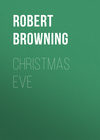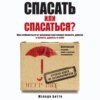Loe raamatut: «Christmas Eve»
Font:
I
Out of the little chapel I burst
Into the fresh night-air again.
Five minutes full, I waited first
In the doorway, to escape the rain
That drove in gusts down the common's centre
At the edge of which the chapel stands,
Before I plucked up heart to enter.
Heaven knows how many sorts of hands
Reached past me, groping for the latch
Of the inner door that hung on catch
More obstinate the more they fumbled,
Till, giving way at last with a scold
Of the crazy hinge, in squeezed or tumbled
One sheep more to the rest in fold,
And left me irresolute, standing sentry
In the sheepfold's lath-and-plaster entry,
Six feet long by three feet wide,
Partitioned off from the vast inside—
I blocked up half of it at least.
No remedy; the rain kept driving.
They eyed me much as some wild beast,
That congregation, still arriving,
Some of them by the main road, white
A long way past me into the night,
Skirting the common, then diverging;
Not a few suddenly emerging
From the common's self thro' the paling-gaps
—They house in the gravel-pits perhaps,
Where the road stops short with its safeguard border
Of lamps, as tired of such disorder;—
But the most turned in yet more abruptly
From a certain squalid knot of alleys,
Where the town's bad blood once slept corruptly,
Which now the little chapel rallies
And leads into day again,—its priestliness
Lending itself to hide their beastliness
So cleverly (thanks in part to the mason),
And putting so cheery a whitewashed face on
Those neophytes too much in lack of it,
That, where you cross the common as I did,
And meet the party thus presided,
"Mount Zion" with Love-lane at the back of it,
They front you as little disconcerted
As, bound for the hills, her fate averted,
And her wicked people made to mind him,
Lot might have marched with Gomorrah
behind him.
II
Well, from the road, the lanes or the common,
In came the flock: the fat weary woman,
Panting and bewildered, down-clapping
Her umbrella with a mighty report,
Grounded it by me, wry and flapping,
A wreck of whalebones; then, with snort,
Like a startled horse, at the interloper
(Who humbly knew himself improper,
But could not shrink up small enough)
—Round to the door, and in,—the gruff
Hinge's invariable scold
Making my very blood run cold.
Prompt in the wake of her, up-pattered
On broken clogs, the many-tattered
Little old-faced peaking sister-turned-mother
Of the sickly babe she tried to smother
Somehow up, with its spotted face,
From the cold, on her breast, the one warm place;
She too must stop, wring the poor ends dry
Of a draggled shawl, and add thereby
Her tribute to the door-mat, sopping
Already from my own clothes' dropping,
Which yet she seemed to grudge I should stand on:
Then, stooping down to take off her pattens,
She bore them defiantly, in each hand one,
Planted together before her breast
And its babe, as good as a lance in rest.
Close on her heels, the dingy satins
Of a female something, past me flitted,
With lips as much too white, as a streak
Lay far too red on each hollow cheek;
And it seemed the very door-hinge pitied
All that was left of a woman once,
Holding at least its tongue for the nonce.
Then a tall yellow man, like the Penitent Thief,
With his jaw bound up in a handkerchief,
And eyelids screwed together tight,
Led himself in by some inner light.
And, except from him, from each that entered,
I got the same interrogation—
"What, you the alien, you have ventured
"To take with us, the elect, your station?
"A carer for none of it, a Gallio!"—
Thus, plain as print, I read the glance
At a common prey, in each countenance
As of huntsman giving his hounds the tallyho.
And, when the door's cry drowned their wonder,
The draught, it always sent in shutting,
Made the flame of the single tallow candle
In the cracked square lantern I stood under,
Shoot its blue lip at me, rebutting
As it were, the luckless cause of scandal:
I verily fancied the zealous light
(In the chapel's secret, too!) for spite
Would shudder itself clean off the wick,
With the airs of a Saint John's Candlestick.1
There was no standing it much longer.
"Good folks," thought I, as resolve grew stronger,
"This way you perform the Grand-Inquisitor
"When the weather sends you a chance visitor?
"You are the men, and wisdom shall die with you,
"And none of the old Seven Churches vie with you!
"But still, despite the pretty perfection
"To which you carry your trick of exclusiveness,
"And, taking God's word under wise protection,
"Correct its tendency to diffusiveness,
"And bid one reach it over hot ploughshares,—
"Still, as I say, though you've found salvation,
"If I should choose to cry, as now, 'Shares!'—
"See if the best of you bars me my ration!
"I prefer, if you please, for my expounder
"Of the laws of the feast, the feast's own Founder;
"Mine's the same right with your poorest and sickliest
"Supposing I don the marriage vestiment:
"So shut your mouth and open your Testament,
"And carve me my portion at your quickliest!"
Accordingly, as a shoemaker's lad
With wizened face in want of soap,
And wet apron wound round his waist like a rope,
(After stopping outside, for his cough was bad,
To get the fit over, poor gentle creature,
And so avoid disturbing the preacher)
—Passed in, I sent my elbow spikewise
At the shutting door, and entered likewise,
Received the hinge's accustomed greeting,
And crossed the threshold's magic pentacle,
And found myself in full conventicle,
—To wit, in Zion Chapel Meeting,
On the Christmas-Eve of 'Forty-nine,
Which, calling its flock to their special clover,
Found all assembled and one sheep over,
Whose lot, as the weather pleased, was mine.
III
I very soon had enough of it.
The hot smell and the human noises,
And my neighbour's coat, the greasy cuff of it,
Were a pebble-stone that a child's hand poises,
Compared with the pig-of-lead-like pressure
Of the preaching man's immense stupidity,
As he poured his doctrine forth, full measure,
To meet his audience's avidity.
You needed not the wit of the Sibyl
To guess the cause of it all, in a twinkling:
No sooner our friend had got an inkling
Of treasure hid in the Holy Bible,
(Whene'er 'twas the thought first struck him,
How death, at unawares, might duck him
Deeper than the grave, and quench
The gin-shop's light in hell's grim drench)
Than he handled it so, in fine irreverence,
As to hug the book of books to pieces:
And, a patchwork of chapters and texts in severance,
Not improved by the private dog's-ears and creases,
Having clothed his own soul with, he'd fain see equipt yours,—
So tossed you again your Holy Scriptures.
And you picked them up, in a sense, no doubt:
Nay, had but a single face of my neighbours
Appeared to suspect that the preacher's labours
Were help which the world could be saved without,
'Tis odds but I might have borne in quiet
A qualm or two at my spiritual diet,
Or (who can tell?) perchance even mustered
Somewhat to urge in behalf of the sermon:
But the flock sat on, divinely flustered,
Sniffing, methought, its dew of Hermon
With such content in every snuffle,
As the devil inside us loves to ruffle.
My old fat woman purred with pleasure,
And thumb round thumb went twirling faster,
While she, to his periods keeping measure,
Maternally devoured the pastor.
The man with the handkerchief untied it,
Showed us a horrible wen inside it,
Gave his eyelids yet another screwing,
And rocked himself as the woman was doing.
The shoemaker's lad, discreetly choking,
Kept down his cough. 'Twas too provoking!
My gorge rose at the nonsense and stuff of it;
So, saying like Eve when she plucked the apple,
"I wanted a taste, and now there's enough of it,"
I flung out of the little chapel.
1.See Rev. i. 20.
Žanrid ja sildid
Vanusepiirang:
0+Ilmumiskuupäev Litres'is:
21 mai 2019Objętość:
35 lk 1 illustratsioonÕiguste omanik:
Public Domain



















